Our yard feels boring right now. For the first time in a few years there are no chickens running around. Should we get a new batch of chicks soon? Would you like to add chickens to your own yard?
Let’s take a pros and cons approach. What do you get out of having chickens, especially when you also have a vegetable garden and fruit trees in your yard? And what do you have to put in to get those benefits?
PRO: Eggs
When I talk chickens in this post, I’m talking about laying hens (mature female chickens), and with these laying hens you have the potential of getting eggs. But more than just eggs, you can get the highest quality eggs in the world.
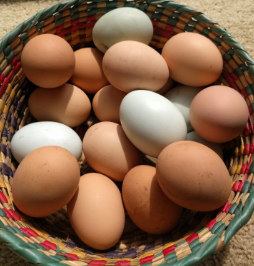
A chicken that eats a natural or close to natural diet produces eggs that are different from the eggs produced by chickens kept in warehouses or those with only a dirt yard to wander on. Chickens are omnivores: they eat blades of grass as well as grasshoppers, if allowed.
No need for lab analysis: as soon as you crack a homegrown egg, the difference glows in the form of a deeper orange yolk.
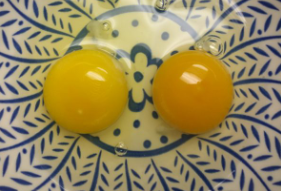
PRO: Turn “trash” into compost
We kept our chickens in a pen for part of each day. Into that pen we threw our kitchen scraps, garden clippings (like old tomato plants), certain weeds (most anything without seeds), and certain bugs (like hornworms).
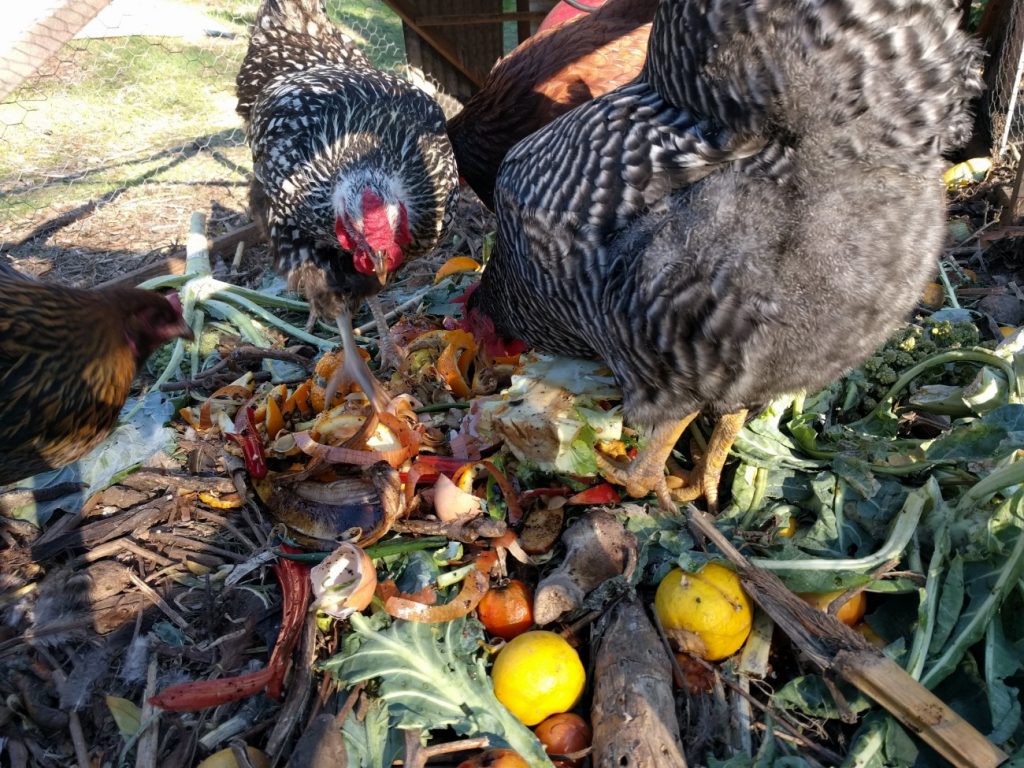
The chickens ate most of this “trash,” turning it into protein for us in the form of eggs. Isn’t it amazing that there is an animal that can take such discards and reform it into something for us to eat?
But the chickens also pooped in that pen, and continually scratched around, and incidentally transformed whatever they didn’t eat into a compost/fertilizer substance.
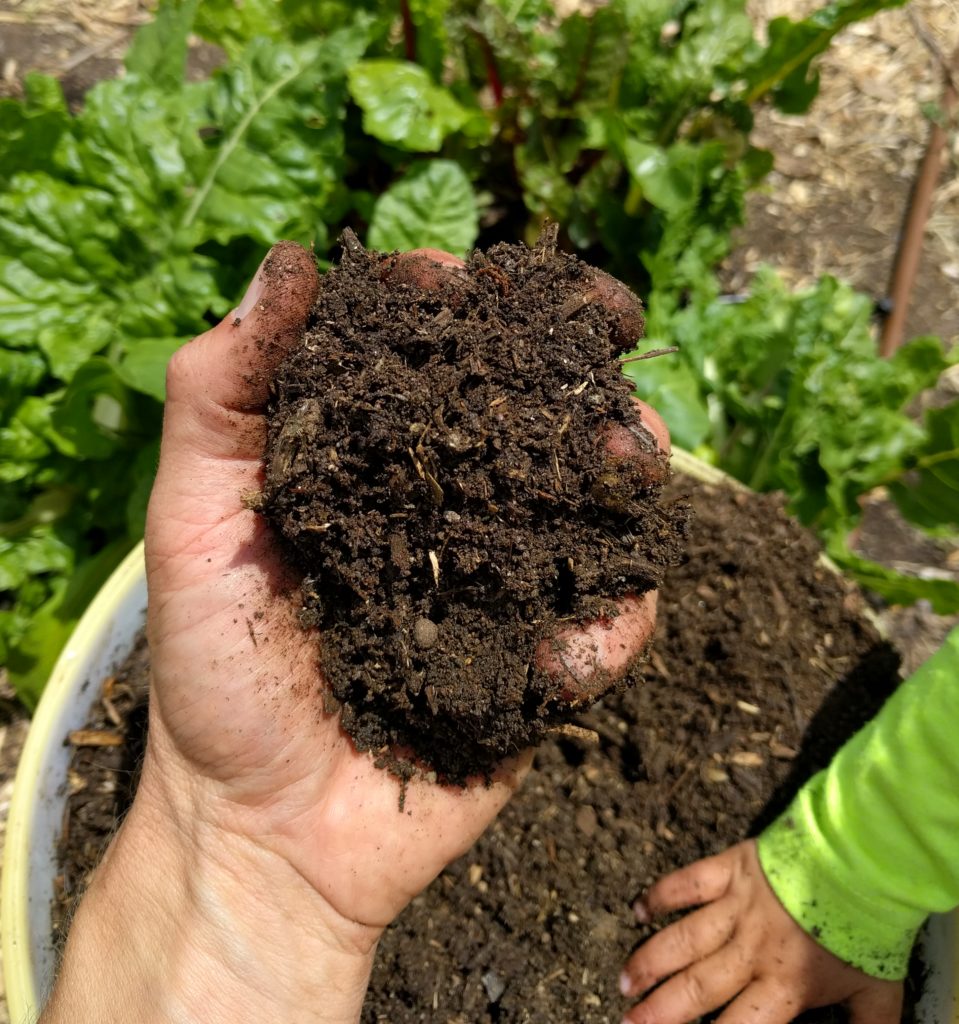
I used this chicken compost to fertilize my vegetable beds and young fruit trees, and I used it like a potting mix to grow all of my vegetable seedlings.
PRO: Eat insect pests
The compost and eggs that the chickens provided were much appreciated, but approximations of them can be bought. You can buy good compost, and you can find someone who raises laying hens in a healthy way such that they produce high quality eggs. But I don’t know what you could buy to replace the pest-control services of chickens.
Originally, I got chicks with the hope that they would control the large numbers of earwigs that were damaging my vegetable garden. It worked, or I can say, they worked. (See my post, “Chickens eat bugs in the garden.”)
Since then I’ve noticed some other insect pests that the chickens eat that would otherwise cause damage to my vegetables and fruit trees. These include June bugs on avocados. (See “Who is eating holes in your avocado leaves?”)
Our chickens have performed this pest control because we let them roam the yard often. A chicken in a stationary coop all day would not be able to do this. Also key to the ability of the chickens to eat insect pests was the mobile pen that I built for them.
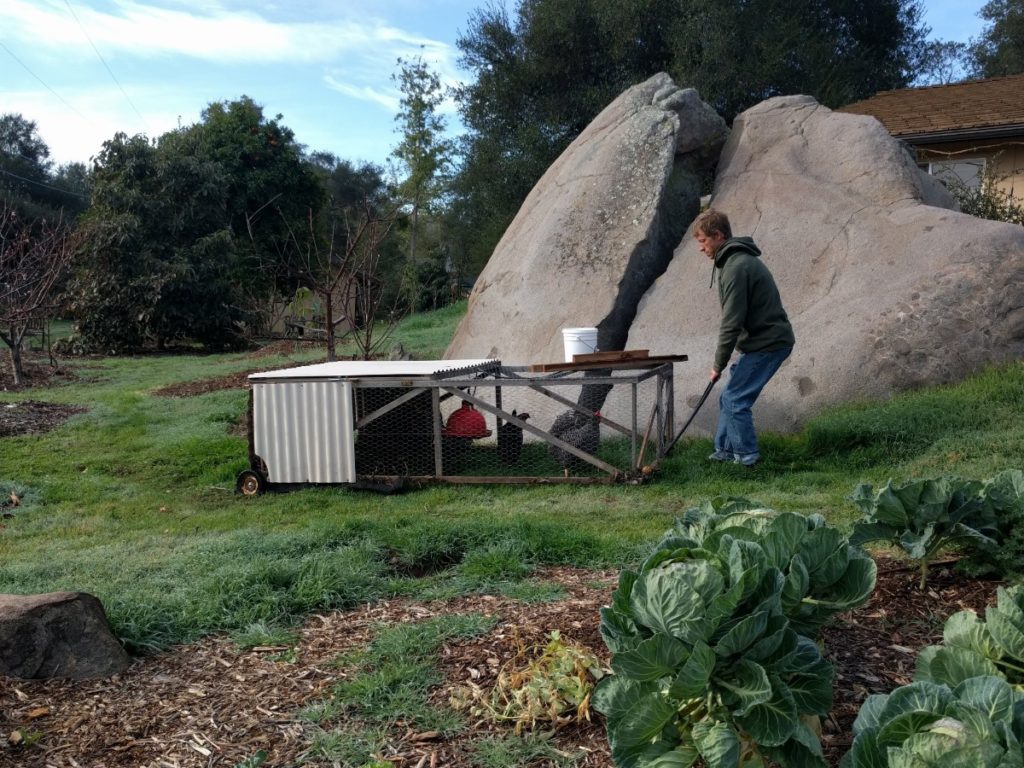
PRO: Fun and didactic for kids
Like any other pet, chickens can be fun to have around if you have kids around. My kids loved picking something from the yard and feeding the chickens (greens, grapes, and pomegranates were among the favorites). Sometimes they herded the flock.
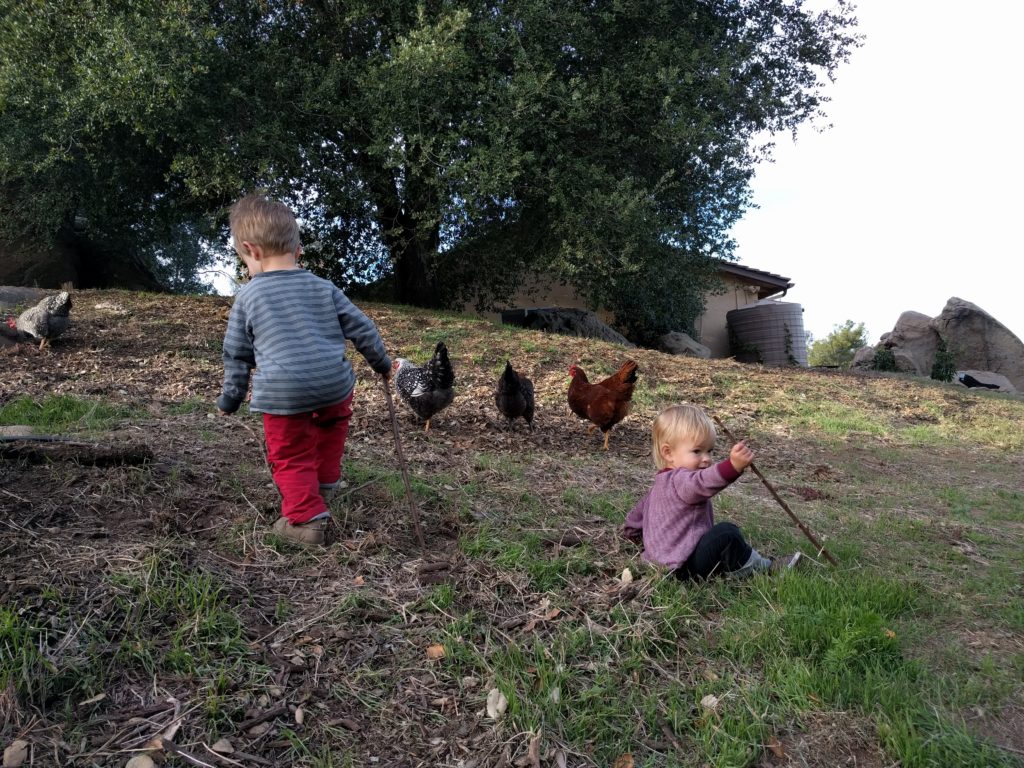
Unlike with most other pets, chickens help kids learn where food comes from. Sometimes we would be in the yard when a chicken was laying an egg. We watched until the hen stood up. Then I reached into the pen, picked up the egg, and handed it to one of the kids. They passed it around, noticing how warm it was and that it was wet; an egg comes out with a protective film on the shell that eventually dries and becomes invisible.
CON: Need food and water
All of the above benefits of having chickens are beautiful, but they’re not free, not in terms of money nor time nor hassle. The most basic cost that comes with having chickens is providing food and water. The costs of bags of chicken feed and water themselves are minimal, and the eggs you can get will be worth more. It’s the cost in terms of time that I’ve found to be higher here, as you need to continually check on the chickens to make sure they have the food and water that they need. This continues when you go out of town, of course.
(See my post, “The economics of backyard chickens and eggs.”)
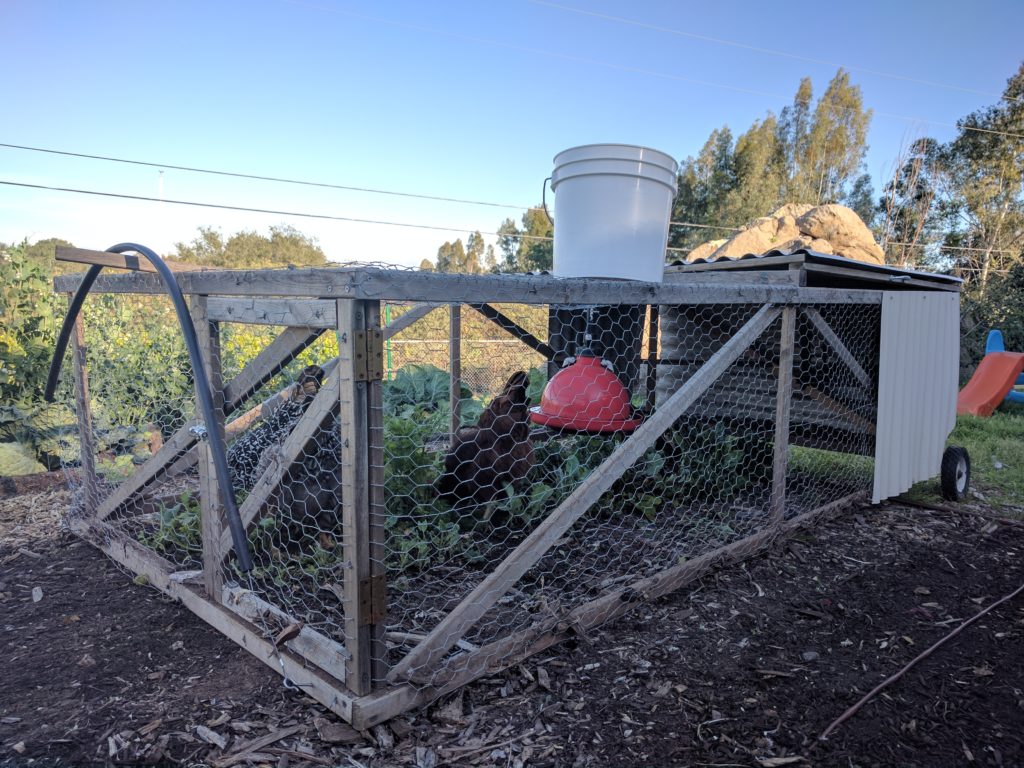
CON: Need shelter from weather and predators
Chickens don’t absolutely need a home. You can let chickens roam freely all day every day, but there are downsides.
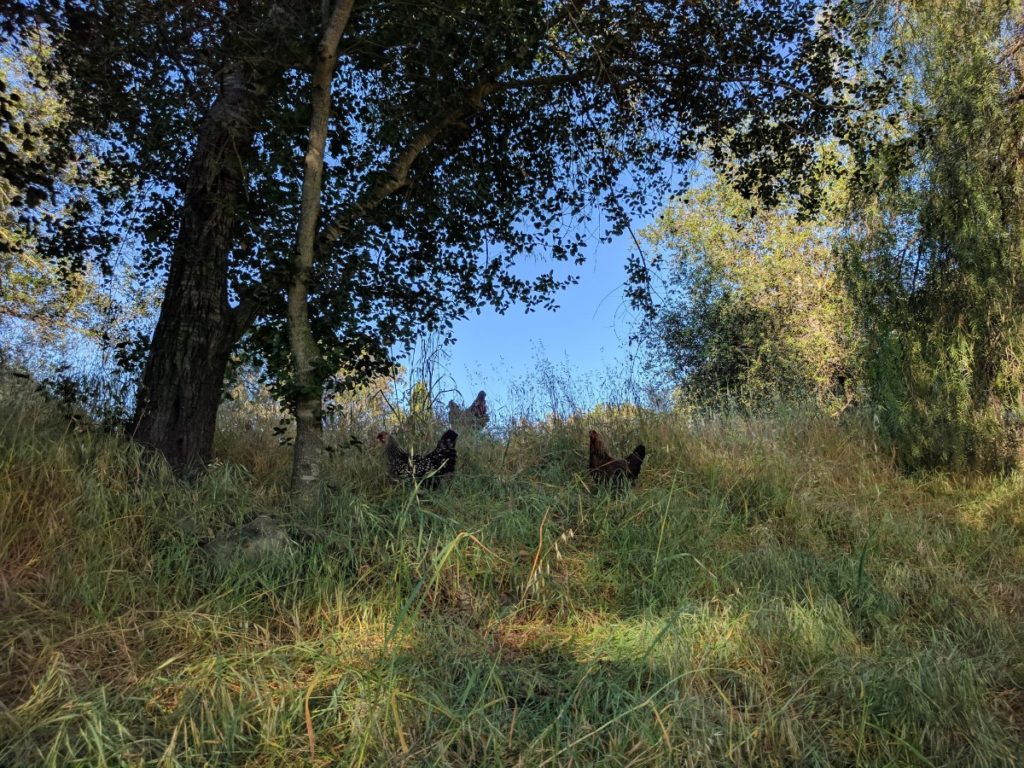
One is that you won’t get many eggs because you won’t know where the chickens are laying them. Two is that the chickens will scratch and poop everywhere. Three is that the chickens need a place to shelter from the weather, particularly shade during summer and protection from rain and wind during winter. If this doesn’t naturally exist in your yard, then you must provide it.
Four is that chickens are vulnerable to predators, even if you live in the city, and especially at night. Chickens can’t see in the dark. Over the years, we’ve lost only one chicken during the day (to a hawk), but more than one during the night to possums, coyotes, and I’m not sure who else.
This is how we lost our last chicken just the other night. I had been letting Rosie roam freely day and night since she was alone and she often refused to go back to the pen for the evening. She was an old and fairly wise bird. She roosted in a tree each night. I think she enjoyed that month or two of liberty until she vanished.
If you really want to keep your chickens safe, it’s best to buy or build a coop that predators can’t get into, and keep your chickens in there at night. As I’ve mentioned, we kept ours in a small, mobile pen that I built for about $100 dollars in materials. It is four feet wide by eight feet long by two feet high, and that 32 square feet was enough for a maximum of four happy hens at any one time.
CON: Shelter needs cleaning or carbon
Any chicken coop needs some kind of cleaning. The chickens poop all day and all night, and it quickly stinks unless you remove the poop or — and this is what I did — add material to soak it up. I added all of the “trash” that I mentioned above, and additionally I added wood chips. Being high in carbon, the wood chips are a wonderful complement to the high-nitrogen chicken poop. The wood chips bring the carbon-to-nitrogen ratio into the range that is ideal for micro-organisms to decompose it and do so without any unpleasant odor.
(See my post, “Why a chicken coop and run should have a floor of wood chips.”)
Either method — cleaning out the coop or adding carbon — requires work, and even my method of consistently adding wood chips requires eventually removing the resulting “chicken compost” since it builds up and raises the level of the ground over time.
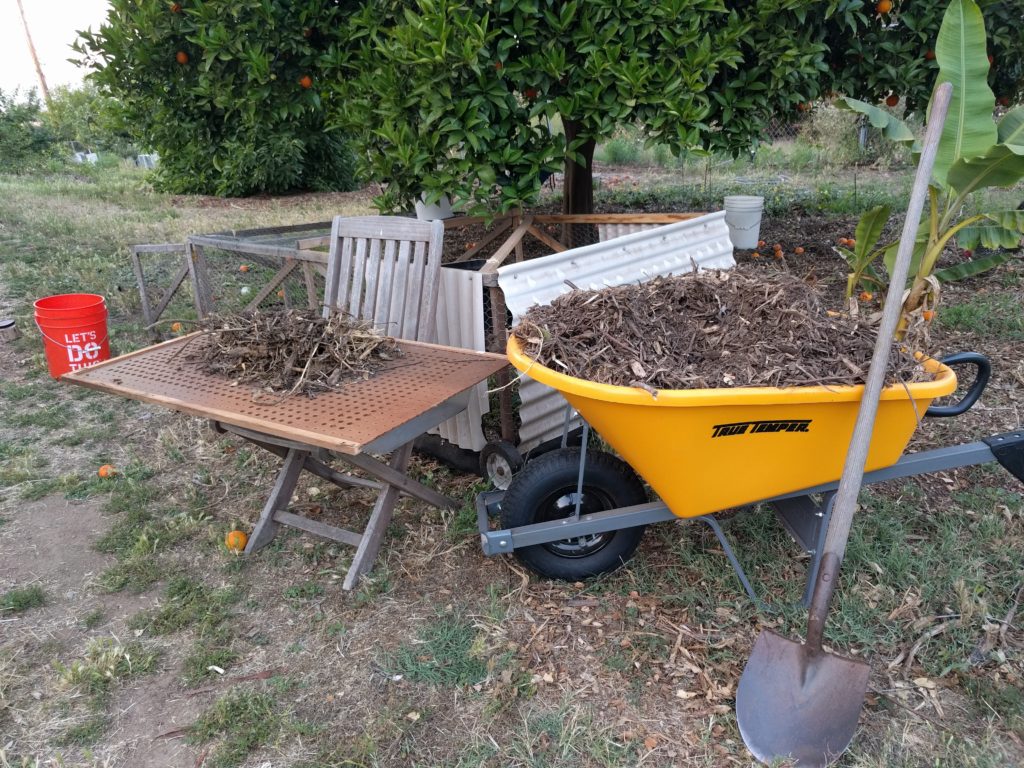
CON: Damage garden if allowed to roam
I don’t like seeing animals in cages so I was always inclined to allow our chickens to roam the yard as much as possible. The downside of letting them roam, however, is the damage they cause in places like the vegetable garden, where they eat certain things (lettuce leaves, tomatoes, e.g.) and they scratch around and uproot seedlings and seeds.
I must note that chickens can be trained a little bit though. Mine rarely damaged the vegetable garden anymore after a year or two of discipline. We do have a large yard for them to continue hunting and pecking in though so I doubt such a result could be obtained in a small yard.
Among the fruit trees, the chickens are highly attracted to mulch, and with good reason. That is where the insects and worms are hiding.
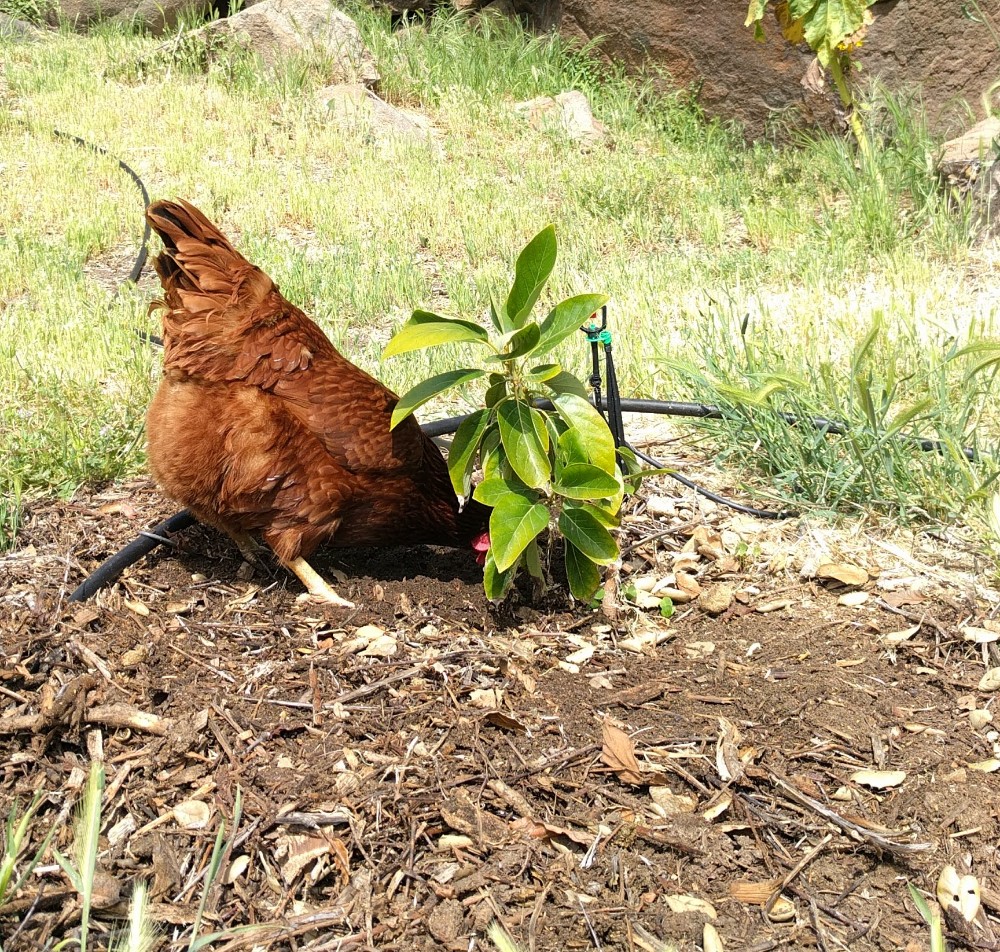
You get the benefit of them eating many pest insects, but you pay for it in mulch that is spread all over the place.
Should you get chickens?
Where does this leave us? Should you get chickens? Of course, I can only answer whether or not I should get chickens, again. For me and my family, the pros continue to slightly outweigh the cons. We eat a lot of eggs, we use a lot of compost in the yard, I need the pest control of the chickens, we have easy access to plenty of wood chips for the pen, and our kids are still young and have a lot to learn about the birds. Plus, as they get older they can take over more chicken chores!
No ads, not in my Yard Posts. That is thanks to generous Supporters like you.
All Yard Posts are listed HERE

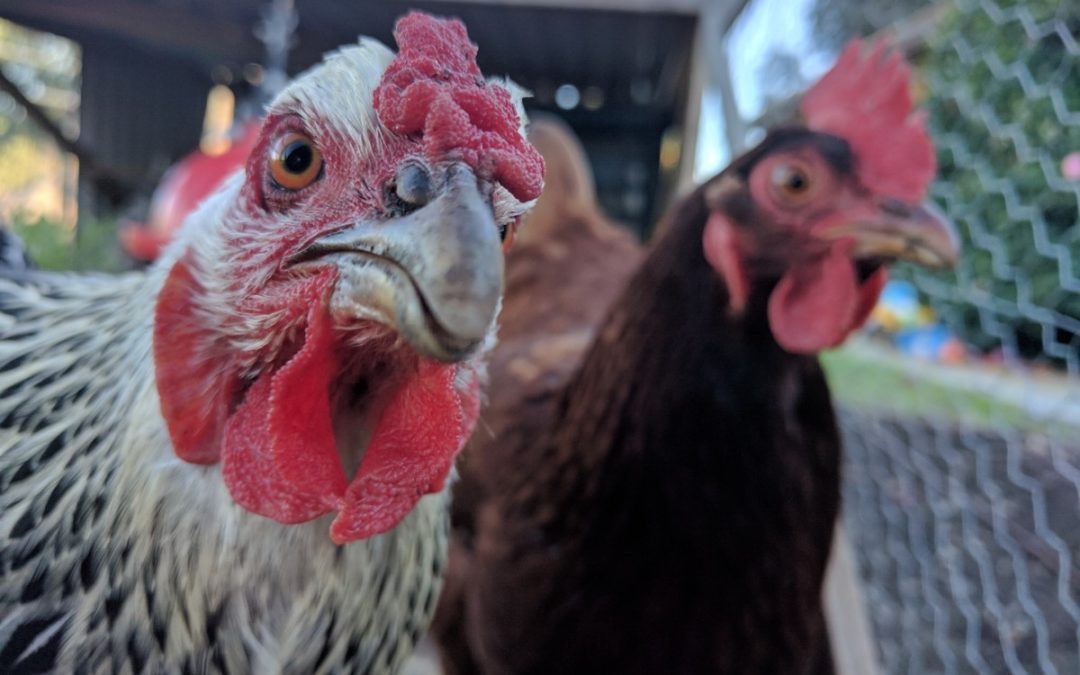

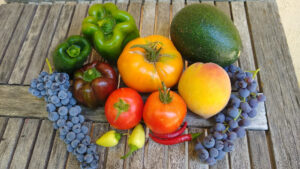
We love our chickens. Our kids do too. Try wagon train feed in Orange for Chicks. They dont have them all the time, but we picked some up about 6 months ago. 6/7 were hens and we found a good home for the rooster. Should have eggs in the spring!
Thanks for the tip, Patrick. I just called Wagon Train and they do indeed have a few chicks right now and plan to get more in mid December. They are allowed to pick them up from outside the quarantine area and drive them back to the store.
Well done Greg. You’ve done most of my work for me when it comes times to lay (no pun intended) out my argument for chickens. Hopefully this will come in handy for years to come.
If you have a garden and/or and orchard get chickens. They do a great job keeping bugs at bay and all of the above mentioned good things. I have to ad a con or two, though. Flies, Flies, and more Flies. The flies show up in late spring and pretty much were a horrible problem until just a week ago as the weather cooled. Keeping it clean is a must but the files are relentless. With flies you could end up with a bird with the dreaded fly strike problem. I’m not going to go into detail here so google it, but it’s not for the faint of heart. We lost a bird over the summer due to this and had another one get it just a week ago but I detected it early and appeared to have stopped it and saved the chicken. Definitely read up on what can go wrong and be prepared to take care of it.
From my research there’s no chicks in San Diego county and probably won’t be for a while unless you get some from a private party. I’ve been told by numerous sources that it would be next year sometime before they’re available again, and that’s only if this Newcastle disease stops. My suspicion is that some of the larger local suppliers may start breeding their own.
Costco in Santee has bags of organic chicken layer feed for around $25. Seems to be a good bargain. I’m not sure what it goes for elsewhere, though.
All comments true. Nothing will rid your yard of slugs, snails or any other bugs like chickens. But they don’t bother our friends the bees. We found that a 24″ high chicken wire fence kept them out of our garden. But whenever your turning over your garden soil I always let them in because with each shovel full they would patiently watch for worms. Worms to chickens are like candy to kids. It was a treat for them. The mobile coup very much needed especially if you have a large yard. I built a small coup under the shade of a tree and let the girls out daily. And yes the eggs are like nothing you can but a the store. Nice write up Greg. Ron Roussell
Then, As a young man with dreams over 50 years ago living in Calaveras County near Angles Camp on 25 verdant acres, we were in the Organic Movement: J.I. Rodale–Organic Gardening and Farming, Gene Logsdon–Two Acre Eden, Mother Earth News, Silent Spring. Raising children, and rabbits, sheep, pigs, turkeys, guinea hens, and our beloved Rhode Island Reds. You are spot on about chickens! They are the best of all. Thanks for bringing back those wonderful memories. And for helping promote The Organic Movement to a new generation. Now, as an old man with just a handful of beautiful avocado trees, you help the memories still linger. Thanks!
Hi Frank,
I love this. Thank you for the story and the images it brought into my mind.
A year ago I was watching a “how do they do it” video on youtube about chickens and egg production. At the end the narrator stated something like, And for all their hard work laying eggs they are killed for the table. When your chickens get to old to lay, what do you do with them – cook them?
We city folk are kind of soft and squeamish of that (at least this city folk is). We named them, too. I figure I get no less than six good qualities from them: eggs, bug removal, fertilizer, no need to compost scraps as they eat them, weed control, and they’re fun to watch. Once they stop laying I still get the other five qualities. They actually provide more for the yard but those are the main ones.
Hi Richard,
Originally, I thought I would cook them up when they stopped laying often enough, but I’ve never done that because I’ve come to appreciate the other services they offer in the yard and I’ve realized how little food they need from us since we have so many garden scraps. Might as well let them live out their lives.
I grew up in an avocado grove in Oceanside in the 50’s. I adopted 5 bantam chickens and within 2 years they had mulched an acre of dead avocado leaves into small pieces while scratching and foraging for bugs under the leaves. The soil became very rich and moisture retentive.
Thank you for taking the time to add this, Doug.
Will chickens damage the roots of a young avocado tree?
Hi Monty,
Yes, the chickens’ scratching does damage avocado roots, especially if the tree has mulch under it. This is because the mulch is both a hospitable environment for the roots (so they’ll grow up into the mulch) and a hospitable environment for worms and insects (so the chickens find food there).
I let my chickens scratch around under older trees quite a bit because they don’t seem to do enough root damage to harm such trees. But I protect my young avocado trees from them. I put wire mesh around them, usually at the outer edge of the mulch because the chickens are very attracted to mulch.
However, I do let the chickens do limited scratching under young avocados, especially here in spring, because they eat many insect pests such as earwigs and June bugs, which can do lots of night feeding on the leaves of young avocados.
Greg,
As a new gardener I always enjoy your posts and the timing for this is incredible. Thank you! My latest obsession is chickens and is it possible for a small garden. As usual I have questions! Haha. I have a small sloped back yard. I want a coop to find the eggs and a tractor run to protect them and guide their foraging. I’m unsure about the composting of chicken poo (how long) etc. And I can only have 2 in Vista but would get 3 for social reasons. This blog has answered some questions but not dissuaded me so far. Still trying to convince my husband. He always likes your posts so fingers crossed! Thanks Greg!
Hi Greg. Just discovered your blog! Wannabe suburban farmer, also here in SoCal.
I’m in the same boat – prefer letting the chickens range free; but then they destroy everything. I built a ~2ft fence to try to separate chicken territory from people/garden territory, but after a month they learned they could get over it. I do have a 3 ft tall raised bed, and that has been high enough to keep them out. The experiment this season is to ‘mulch’ the trees in chicken territory with split logs to keep them from digging. I’ve got a list going of plants that they don’t eat, and will be planting those around the trees. Will keep you posted if you like!
Keep up the good work.
Hi John,
Thanks for those ideas. I’ve never thought of mulching with split logs like that. Interested to hear how that works. I used to try mulching around certain trees with prunings from live oak trees that I thought were big enough to deter the chickens, but they still got in their and scratched and made their mess. Thanks again for the contributions!
Bought a dream home with 10 acres on a riverbed that is infested with portugese millipedes (small worm looking ones that curl when disturbed). Im looking for fowl that will eradicate them. They are invading my house! Will chickens or Guinea eat them? If so, what breed would be best for free range to rid these suckered before I have to sell my home? EastTexas Thanks!
Wow, Michelle. Reminds me of when earwigs were invading my home. But I don’t know if chickens or guinea fowl will eat those critters, unfortunately. I’ve never seen my chickens encounter them.
Hi Greg. Thanks for all the information. I recently got chickens and I am planning on running my kitchen scraps through them for fertilizer and great eggs. But, I recently read that avocado shells can be toxic to them. Is this something you’ve heard before? Should I be sure to keep them away from avocado scraps.
Hi Walter,
Haven’t heard of this. I put every part of every avocado we eat into the chicken pen: seed, peel, leftover flesh. They never eat anything except leftover flesh, but the seeds and peels break down eventually to become part of the compost mix.
Hi! Question about the deep litter method with mulch. We’re about 6 weeks into it, loving how it absorbs the bad smells and all I have to do is add a little more or turn it a bit if we start smelling the coop again. It’s awesome!!! And I am so excited to use the composted stuff to get my spring garden beds ready.
HOWEVER…last week, my daughters and I got eaten alive with bug bites. My husband and son never got bitten, but we all started seeing these teeeeeeny little bugs crawling on us. After tons of time on Google, I figured out they were mites, and then turning the mulch the other day, I discovered them completely infesting the mulch inside of the coop. I’ve ordered some permethrin and plan to completely empty the coop and spray it down, as well as dust all our chickens with the powdered form. (Although they don’t seem to be exhibiting the expected symptoms and we haven’t seen any crawling around on them yet. But I can’t imagine they haven’t been affected, as we are crawling with them every time we walk into the coop!)
Now, in my research, chicken mites seem like a pretty extreme problem, with several posts even recommending burning the whole coop down (and the bedding) as the only way to truly eradicate the mites. Meanwhile, I found a post on a garden forum (with a link to a YouTube video of mites in mulch that looked EXACTLY like what I’m dealing with) that advised the gardener NOT to spray with chemicals because these help break down the mulch and are a necessary part of the process.
Do you have any thoughts on this or experience with mites???
I’m trying to be as organic as is reasonable, but the discomfort these bugs have caused me and my girls has been far worse than our summer mosquito bites, and I can’t imagine forcing my chicken girls to live with them. Unless they really aren’t bothering them and are unavoidable in mulch??? Eek!
Wow, Rachel! Sounds nasty. I have never experienced this. I’m wondering if it has anything to do with allowing chickens to dust bathe.
Under your mulch is there soil or some kind of flooring? I’ve never kept my chickens on a floor. They’ve always scratched a hollow out of the mulch in their pen to dust bathe in the soil below. Also, I let them run around in the evenings often where they find other places to dust bathe. Maybe this is important for hygiene and coop health?
To control mites, throw down food grade diatomaceous earth. Dust your chickens with it. You can get a 50lb bag for cheap at your local feed store. I also dust my fruit trees with it after fruiting to get rid of unwanted critters.